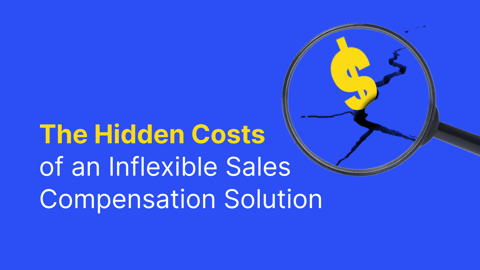Talk to any seasoned sales professional about their career and experiences and the term shadow accounting may likely be mentioned. If that person uses the term in the present tense while talking about their current role, we can assume that the level of trust in their existing Incentive Compensation Management (ICM) program and managers could be of a higher level, as the practice of shadow accounting is certainly not part of the standard job description. In this blog, we’ll look at what it is, what causes it to occur and of course a watertight solution to make it go away – which as demonstrated by the respondents of Varicent’s Forrester Study, The Total Economic Impact™ of Sales Performance Management Software– is a reliable, transparent and accessible ICM software platform.
What is Shadow Accounting?
While many in the sales sector that are regular shadow accounting performers may sigh deeply before simply defining it as “a necessary evil”, there is a wider meaning. Sometimes referred to as shadow auditing, it’s the process or method by which a sales executive keeps a tally of their own sales and figures record away from the official numbers, which allows them to independently verify or dispute their incentive compensation pay-out.
Why Does it Happen?
The necessity to do some shadow accounting is triggered by three key factors.
1. Lack of transparency and visibility: Anyone that is part of an incentive compensation scheme needs full sight and access to what the plan is, what they stand to gain, and notification when there are any changes to it. A deficit in transparency or a blockage to relevant data can give rise to the sensation that other colleagues may be getting a different pay-out for similar results, or there is inequity in quota or territory allocation. Any opaqueness will eventually lead to doubt and the urge to do their own math.
2. Inaccurate payment calculations: Doubt is one thing, but the certainty that calculations are indeed inaccurate and affecting salary and commission is a recipe for next-level discontentment. When word spreads of this, as it certainly will, that means more people using their time and energy to check their numbers. And any errors in the official calculations (often caused by legacy systems, disparate processes, and manual inputting error) will also unbalance and erode other financial reporting areas.
3. Vote of no-confidence: For any regular practitioner of shadow accounting that can prove underpayment, this injustice will not just demotivate, but will probably result in them seeking alternative employment. With incentive compensation schemes sitting close to the heart of every sales operation, the blame is likely to be shared between the actual technology, the processes behind it, and those that implement and maintain it.
The Answer is an ICM Software Solution
We’re no longer living in a time where bean-counting and keeping sales records in notebooks is the limitation to how we balance commission and remunerate sellers. To eradicate the issue of shadow accounting, the technology and tools are there to be utilized. And when you get the right system for your business needs, such as Varicent’s ICM platform, the rewards and advantages don’t begin and end with more accurate and satisfying incentive calculations and potential pay-outs. The main benefits include:
- Better Visibility, More Transparency: It’s neat that one of the biggest solutions is in answer to one of the key bugbears. A robust ICM software tool gives both the sales professional and their managers the full picture of where they are, where that data has been sourced from, how the rest of the team is doing and what else they might need to do to up their sales game. No more secrets or hidden pathways to success. As revealed by the findings of the Forrester Study, once the Varicent platform had been implemented, the trust of the workforce grew quickly, and they were also more confident of the information they have when visiting potential customers. The platform not only allowed sales professionals to view data in real-time, but they could post queries immediately, giving them back a sense of control.
- Greater Efficiency and Accuracy: When automated technology can be relied upon to correctly measure payment calculations, everything else starts to feel a bit better and more straightforward; human trust and reliance in the system can flourish, while shadow accounting habits diminish. That sense of trust is even stronger when users know that even behind this watertight system, there are mechanisms that kick in to catch errors in good time. This leap in accuracy levels produces a further business benefit — fewer hours spent on audits and trying to solve payment queries, so more time can be focused on projects that will make money for the business rather than drain it.
- Deeper Loyalty, Motivation, and Trust: While the average sales professional was spending working time on shadow accounting and feeling that they weren’t getting what they had earned, the other item on their minds which may have been a distraction was whether to leave their position in search of greener pastures and fairer commission. But with this value-rich software comes fresh confidence in the business and themselves, reigniting their loyalty for the business and passion for selling. There is no longer the distraction of double-checking the numbers and, consequently, that is an incentive to perform even better.
We could simply summarize by stating that to permanently throw off the shackles of shadow accounting, you should get on board with an ICM software solution, but you have a budget, right? Consider this. The moment you start to consider this as a long-term investment and a way to iron out the kinks of compensation uncertainty, you’ll feel the benefits and say farewell to parallel payment assessments for good.
Find out more about how the business’ surveyed banished shadow accounting by downloading the full Forrester Report today.



